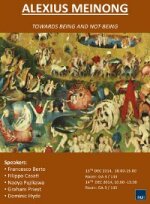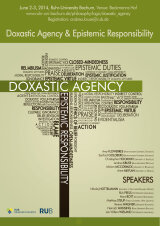December 2014
The DFG approved the research project "Doxastic Agency and Epistemic Responsibility", a project that applies the modal logic of agency to problems of epistemology. The project will start in the secod half of 2015.
The volume Dag Prawitz on Proofs and Meaning, Outstanding Contributions to Logic, Vol. 7, Heinrich Wansing (ed.), appeared.

Filippo Casati organized the workshop Alexius Meinong. Towards Being and Not-Being, on December 13 and 14. The speakers were: Francesco Berto, Filippo Casati, Naoya Fujikawa, Dominic Hyde, and Graham Priest.

November 2014
In the colloquium on Logic and Epistemology, Prof. Grigory Olkhovikov, University of Ekaterinburg and University of Tübingen, gave a talk "On definability by inference rules in intuitionistic propositional logic" (November 25) and Prof. Miriam McCormick (University of Richmond) presented a talk on "What do beliefs feel like?" (November 4).
Prof. Heinrich Wansing joined the programme committee of Trends in Logic XV, Logics for Social Behaviour, Delft, 29 June to 3 July 2015, http://www.appliedlogictudelft.nl/trends-in-logics-2015-logics-for-social-behaviour/
October 2014
Filippo Casati (Graduate Center, CUNY) arrived to teach a class on "Quine, Meinong and Heidegger: On what there is (not)" in the context of the rectorate's program for research-oriented teaching "Forschendes Lernen".
Prof. Heinrich Wansing joined the programme committee of GAP.9 Philosophie zwischen Lehnstuhl und Labor / Philosophy Between Armchair and Lab, Osnabrück, September 2015, as chair of the Section on Logic.
September 2014
Dr Dunja Seselja gave a talk (together with Dr Christian Straßer) at the Workshop on Norms of Reasoning. Topic: The Normative Role of Evaluative Stances in Scientific Disagreements.
Prof. Heinrich Wansing gave a talk on the methodology of paraconsistent logic at the New York Logic Colloquium, September 8, took part in the celebration event for Johan van Benthem on the occasion of his official retirement from the University of Amsterdam, http://www.illc.uva.nl/J65/, September 26 and 27, and gave a talk on the Curry paradox at the XXIII. Kongress der Deutschen Gesellschaft für Philosophie in Münster, September 29.
August 2014
A revised and updated version of the entry on connexive logic in the Stanford Encyclopedia of Philosophy has been released, see http://plato.stanford.edu/entries/logic-connexive/.
This year the Alexander von Humboldt Foundation has singled out 11 international junior researchers between 29 and 40 years of age for one of the best-endowed science awards in Germany: The winners will each receive up to EUR 1.65 million. Through this programme, the research talents receive risk capital for innovative projects during an early phase in their careers.
They conduct research at a German university or research institute for a period of up to five years and develop their own research group for this at their host institute. The junior researchers selected in 2014 will be presented the award by Federal Research Minister Johanna Wanka and the president of the Alexander von Humboldt Foundation, Helmut Schwarz, in Berlin on 11 November.
Among the recipients of the 2014 Kovalevskaja Awards is the philosopher and logician Dr Christian Straßer.
New logic for increasingly complex science
In a world filled with incomplete and uncertain information, we often draw conclusions that, when new information emerges, are defeasible and therefore revisable. Such conclusions are not only of pivotal importance in everyday life, they are also crucial in scientific evaluations and argumentation. In logic, these methods for reaching logical conclusions are formalised with the aim of developing a precise, mathematical model for defeasible reasoning. The German philosopher and logician Christian Straßer most recently worked in Belgium. He has focussed his attention on developing a comprehensive theory of logical reasoning that links models from formal logic with models from formal argumentation theory. Such a theory would offer a new instrument for understanding defeasible reasoning, such as for fields of application like normative and scientific reasoning.
Dr Christian Straßer was born in Germany in 1978. As a student at the University of Passau he first studied computer science and then added philosophy. He graduated with distinction in 2006 with a degree in both disciplines. He switched to the Centre for Logic and Philosophy of Science at the University of Ghent as a doctoral candidate in 2007 and was awarded a doctorate in 2011. Since then he has worked as a postdoc on developing models for defeasible reasoning. Starting September he will conduct research in this area with his own team at the University of Bochum. http://aktuell.ruhr-uni-bochum.de/pm2014/pm00123.html.de, http://www.humboldt-foundation.de/web/skp-2014-2-en.html#strasser
Host institute: University of Bochum, Institute for Philosophy II; Host: Professor Dr Heinrich Wansing
Welcome to Bochum, Christian!
July 2014
Sanderson Molick (U Natal, Brazil) gave a talk on "Exploring Suszko's thesis and generalized truth values" (joint work with Carolina Blasio, UNICAMP) on July 10.
Prof. Heinrich Wansing was an invited speaker at The 13th Trends in Logic international conference, University of Łódź, July 2-5, 2014.
June 2014
Logic Day in Bochum, Thursday, June 26, Ruhr University Bochum, Room GA 6/153
10:00-11:00 Umberto Rivieccio, (University of Delft), "Four-valued modal logic"
11:15-12:15 Sergei Odintsov, (Sobolev Institute, Novosibirsk), "How to define a consequence relation over a class of bilattices?"
15:00-16:00 Giuseppe Greco, (University of Delft), "From Display to Display-type Sequent Calculi”
16:15-17:15 Heinrich Wansing, (Ruhr University Bochum), "On the methodology of paraconsistent logic"
17:30-18:30 Alessandra Palmigiano, (University of Delft), "Algebraic Semantics and Model Completeness for Intuitionistic Public Announcement Logic"
*****
Prof. Heinrich Wansing was an invited speaker at the conference Paraconsistent Reasoning in Science and Mathematics, LMU, Munich, June 11 - 13, 2014.
Prof. Sergei Odintsov (Sobolev Institute of Mathematics, Novosibirsk) took up his Humboldt Research Fellowship (June 1 - June 30). His research in Bochum concerned 'How to define a logic over a class of bilattices'.
Amy Flowerree (Northwestern University, Evanston) visited Andrea Kruse for one month at the Chair of Logic and Epistemology.
The Workshop "Doxastic Agency & Epistemic Responsibility", took place in Bochum on June 2-3.

May 2014
Prof. Heinrich Wansing was an invited speaker at The 6th International Conference Teaching Logic and Prospects of its Developmentat the Taras Shevchenko National University of Kyiv, May 15-17, 2014.
On May 26, Dr Roy Dyckhoff (St Andrews) gave a talk in Bochum on "Intuitionistic decision procedures since Gentzen."
April 2014
Andrea Kruse gave a talk on An Externalist Approach to Epistemic Blameworthiness on the workshop Responsibility - The Epistemic Dimension in Amsterdam.
On the invitation of Dr Allard Tamminga, Prof. Heinrich Wansing gave a talk "Remarks on an external consequence Curry paradox" at the University of Groningen (GroLog Colloquium), April 3, 2014.
March 2014
Andrea Kruse's application at the RUB Research School for funding of the Workshop on Doxastic Agency and Epistemic Responsibilty was successful, see http://www.ruhr-uni-bochum.de/phil-alt/tagungen/doxastic_agency/home-DAER.html
Prof. Graham Priest and Prof. Heinrich Wansing took part in the 42nd Symposium for Research Award Winners in Bamberg, where Graham Priest received his Humboldt Research Award.
The IfCoLog Journal of Logics and their Applications has now a website at http://www.collegepublications.co.uk/journals/ifcolog/. Prof. Heinrich Wansing joined the editorial board in 2013.
February 2014
Daniel Skurt gave a talk in Kolkata, India, on Iterated preferential models as a strategy to make many-valued paraconsistent logics non-monotonic at the 5th World Congress on Paraconsistency.
Prof. Heinrich Wansing joined the program committee of the workshop on Defeasible and Ampliative Reasoning (DARE) at The Twenty-first European Conference on Artificial Intelligence, ECAI, see http://www.ecai2014.org/workshops.
January 2014
Dr Hitoshi Omori (City University of New York) gave a lecture on Contradiction, Negation and Paraconsistency in the departmental colloquium of the Institute of Philosophy II.